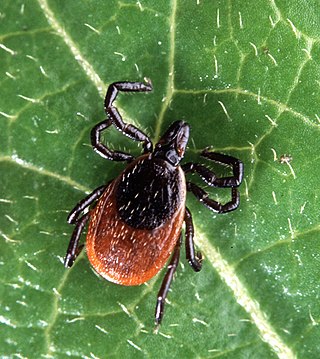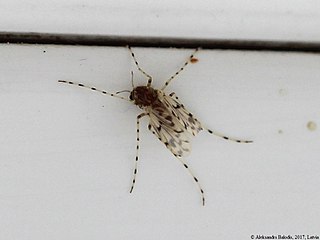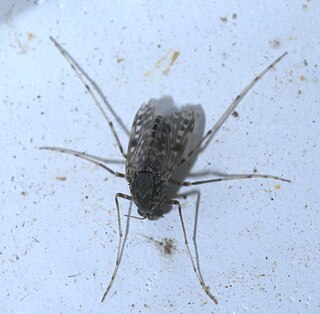
A midge is any small fly, including species in several families of non-mosquito nematoceran Diptera. Midges are found on practically every land area outside permanently arid deserts and the frigid zones. Some midges, such as many Phlebotominae and Simuliidae, are vectors of various diseases. Many others play useful roles as prey for insectivores, such as various frogs and swallows. Others are important as detritivores, and form part of various nutrient cycles. The habits of midges vary greatly from species to species, though within any particular family, midges commonly have similar ecological roles.

The Australian king parrot is a species of parrot endemic to eastern Australia ranging from Cooktown in Queensland to Port Campbell in Victoria. Found in humid and heavily forested upland regions of the eastern portion of the continent, including eucalyptus wooded areas in and directly adjacent to subtropical and temperate rainforest. They feed on fruits and seeds gathered from trees or on the ground.

The Chironomidae comprise a family of nematoceran flies with a global distribution. They are closely related to the Ceratopogonidae, Simuliidae, and Thaumaleidae. Many species superficially resemble mosquitoes, but they lack the wing scales and elongated mouthparts of the Culicidae.
Powassan virus (POWV) is a Flavivirus transmitted by ticks, found in North America and in the Russian Far East. It is named after the town of Powassan, Ontario, where it was identified in a young boy who eventually died from it. It can cause encephalitis, inflammation of the brain. No approved vaccine or antiviral drug exists. Prevention of tick bites is the best precaution.

Ixodes scapularis is commonly known as the deer tick or black-legged tick, and in some parts of the US as the bear tick. It was also named Ixodes dammini until it was shown to be the same species in 1993. It is a hard-bodied tick found in the eastern and northern Midwest of the United States as well as in southeastern Canada. It is a vector for several diseases of animals, including humans and is known as the deer tick owing to its habit of parasitizing the white-tailed deer. It is also known to parasitize mice, lizards, migratory birds, etc. especially while the tick is in the larval or nymphal stage.

Apsectrotanypus is a genus of midges in the family Chironomidae. There are about six described species in Apsectrotanypus.

Tanypodinae is a subfamily of midges in the non-biting midge family (Chironomidae). The larvae are generally carnivorous and their mouthparts are adapted for predation on small invertebrates although 1st and 2nd instar larvae also feed on algae.

Psectrotanypus is a genus of non-biting midges in the subfamily Tanypodinae of the bloodworm family Chironomidae. Psectrotanypus varius is known to occur in very polluted waters with only few other accompanying species such as Chironomus plumosus.

Tanypus is a genus of non-biting midges in the family Chironomidae. There are at least 100 described species in Tanypus.
Coelotanypus atus is a species of midge in the family Chironomidae.

Coelotanypus is a genus of midges in the family Chironomidae. There are about 5 described species in Coelotanypus.
Lampria is a genus of robber flies in the family Asilidae. There are at least 20 described species in Lampria.
Apachekolos scapularis is a species of robber flies in the family Asilidae.
Melanoplus scapularis, known generally as the lesser fork-tail grasshopper or scapular spur-throat grasshopper, is a species of spur-throated grasshopper in the family Acrididae. It is found in North America.
Coelotanypus tricolor is a species of midge in the family Chironomidae.
Listronotus scapularis is a species of underwater weevil in the beetle family Curculionidae. It is found in North America.

Coelotanypus concinnus is a species of midge in the family Chironomidae. It is found in North America, east of the Rocky Mountains.

Mordellochroa scapularis, the gold-shouldered mordellid, is a species of tumbling flower beetle in the family Mordellidae. It is found in North America.

Odontota scapularis, the orange-shouldered leaf miner, is a species of leaf beetle in the family Chrysomelidae. It is found in North America.

Hallomenus scapularis is a species of polypore fungus beetle in the family Tetratomidae. It is found in North America.














